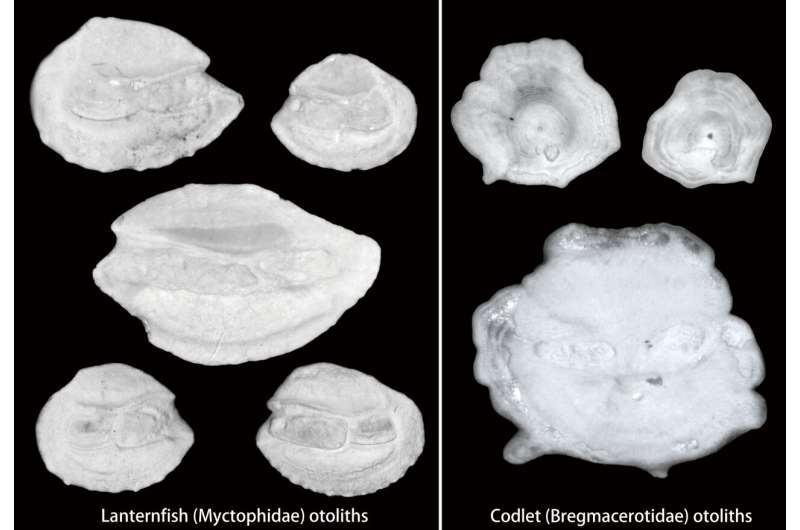July 13, 2023 report
This article has been reviewed according to Science X's editorial process and policies. Editors have highlighted the following attributes while ensuring the content's credibility:
fact-checked
peer-reviewed publication
trusted source
proofread
Fossilized inner ears of fish used to correlate marine ecosystem health with ocean temperature over 460,000 years

Research by the Biodiversity Research Center and Institute of Oceanography, National Taiwan University in Taiwan, has linked intermediate-depth fish populations and diversity to ocean temperatures through fossilized inner ear bones of fish.
In the paper, "Ocean temperature drove changes in the mesopelagic fish community at the edge of the Pacific Warm Pool over the past 460,000 years," published in Science Advances, the team reconstructs the history of mesopelagic ocean ecosystems to reveal that anthropogenic ocean warming will lead to marine ecosystem degradation.
Mesopelagic fish are any fish that reside at ocean depths between 650 and 3,300 feet (200–1,000 m). These fish populations are constantly in diurnal vertical migration, moving up and down within the water column following food or avoiding predators. Their role in linking the surface and deep-ocean ecosystems is essential for the biological carbon pump.
Using extraordinarily well-preserved fish otoliths (inner ear bones) found in sediment cores collected from the ocean floor between Papua New Guinea and the Solomon Islands, 1,130 otoliths from 343 sediment samples were analyzed, representing 28 taxa from 12 families.
The study finds that over the past 460,000 years, fish production and diversity followed hump-shaped temperature gradients. The record shows it takes less temperature change to negatively affect diversity than overall production by ~1.5° to 2.0°C. During the warmest interglacial periods, both production and diversity declined drastically.
The sharpest decreases were following the end of warming phases above current ocean temperatures, indicating that peak warmth is causal to declining fish production and diversity. Extremely high temperatures during certain periods negatively impacted the marine ecosystem, possibly due to lower oxygen levels in the water.
The mesopelagic fish community in the study region shows fluctuations in fish production and diversity over glacial-interglacial timescales. Fish production is seen higher during the interglacial periods, while species diversity is higher during glacial periods. The correlation with temperature gradients further illustrates the significant role of temperature in shaping fish production and diversity patterns.
An interesting trend observed in the study was a consistent decrease in fish population and an increase in species diversity over the past four glacial cycles. Compared to present-day and Holocene conditions (less than 10,000 years ago), peak fish populations were significantly higher during past periods. The reasons behind this observation are unclear.
The study provides critical baseline ecological data and implications for fishery management associated with ocean ecosystems. It is important to note that the study tracked changes in diversity and population in glacial-interglacial timescales over 460,000 years, and the fluctuations in temperature between glacial in interglacial periods occurred over tens of thousands of years. There is no precedent for the rate at which anthropogenic ocean warming is taking place.
More information: Chien-Hsiang Lin et al, Ocean temperature drove changes in the mesopelagic fish community at the edge of the Pacific Warm Pool over the past 460,000 years, Science Advances (2023). DOI: 10.1126/sciadv.adf0656
Journal information: Science Advances
© 2023 Science X Network


















